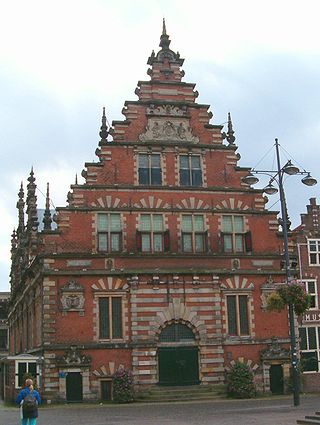
The Vleeshal is a historical building dating from 1603 on the Grote Markt in Haarlem, the Netherlands.

The Hoofdwacht is a historically important rijksmonument. It was built in the 13th century and it is considered the oldest building in Haarlem, Netherlands. It has served as a printshop for Coornhert, as a temporary council meeting location across from City Hall and even as a jail. It is located on the Grote Markt across from the St. Bavochurch.

The Hofje van Bakenes or Bakenesserkamer is a hofje in Haarlem, Netherlands, located between the Bakenessergracht and the Wijde Appelaarsteeg. In the Middle Ages "kamer" or "room" meant house. Usually the houses within a hofje consisted of just one single room.

The Hofje van Staats is a hofje in Haarlem, Netherlands, on the Jansweg 39, close to the Haarlem railway station.

The Hofje van Loo is a hofje on the Barrevoetstraat 7 in Haarlem, Netherlands.

The Remonstrantshofje is a hofje in Haarlem, Netherlands. It is one of the hofjes in Haarlem that is traditionally used to provide housing for elderly people.

The Wijnbergshofje is a hofje in Haarlem, Netherlands, on the Barrevoetstraat.

Frans Hals Museum - Hal is one of the two locations of the Frans Hals Museum, located on the Grote Markt, Haarlem, Netherlands, where modern and contemporary art is on display in alternating presentations. The emphasis is on contemporary photograph and video presentations, with the focus on Man and society.

The Museum De Cruquius occupies the old Cruquius steam pumping station in Cruquius, the Netherlands. It derives its name from Nicolaas Kruik (1678–1754), a Dutch land-surveyor and one of many promoters of a plan to pump the Haarlemmermeer dry. Like many well-educated men of his time, he latinized his name to Nicolaus Samuel Cruquius. During his lifetime the issue of the Haarlem Lake and how to pump it dry was international news, as the following excerpt from the Virginia Gazette on 31 May 1751 illustrates:

The Stadsbibliotheek Haarlem is a collective name for all public libraries in the Haarlem area of the Netherlands. The first public library of Haarlem opened in 1921 at the cloisters of the Haarlem City Hall where the academic library had been since 1821. The move to open its doors to the public with a public reading room was only possible after the previous occupant of the downstairs cloisters, the Frans Hals Museum, moved out in 1913 to its present location. As of 2009, there are 6 public libraries and 10 lending points, such as in hospitals.

The Waalse kerk is a historical church dating from the 14th century on the Begijnhof in Haarlem, Netherlands.

The St. Joseph kerk is a church dating from the 19th century on the Jansstraat in Haarlem, Netherlands. It is located across from the Janskerk (Haarlem).
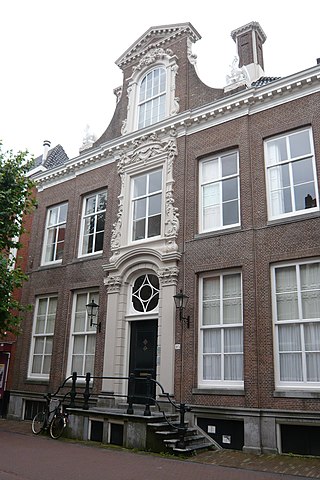
Trou Moet Blycken is a historical chamber of rhetoric over 500 years old and currently a gentlemen's club located in the middle of a busy shopping area on the Grote Houtstraat in Haarlem, Netherlands.

Iepenrode, or Ipenrode, is the name of a villa in Heemstede, the Netherlands, between the Leidsevaart and Herenweg, located north of Huis te Manpad and south of Berkenrode. It was once the summer home of various mayors (burgemeesters) of Haarlem and is currently privately owned.
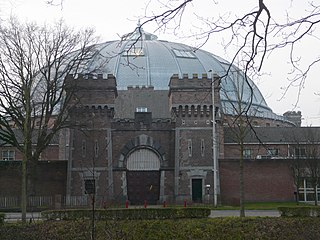
The Koepelgevangenis is a former prison in Breda, Netherlands, constructed in 1886, best known as the prison where convicted World War II collaborators and Nazi war criminals were housed.

Restaurant ML is a restaurant located in Haarlem, in the Netherlands. It is a fine dining restaurant that was awarded one Michelin star in the period 2011–present.
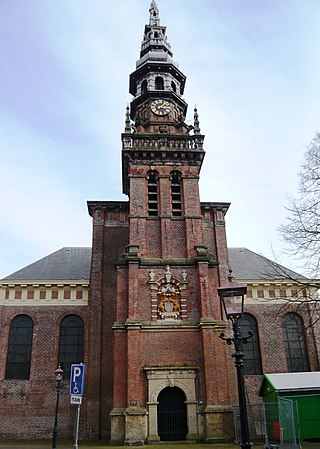
The Nieuwe Kerk is a historical Protestant Reformed church dating from the 17th century on the Nieuwe Kerksplein in Haarlem, Netherlands.
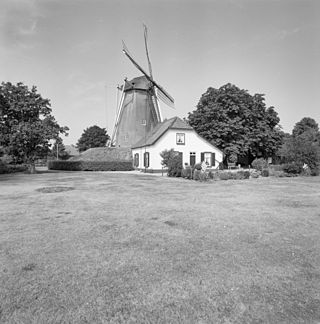
De Keetmolen is a windmill in Ede, Netherlands. According to the inscription under the sails and the sign at the entrance, the mill was built in 1750. This is incorrect; according to municipal records, the building permit issued in 1856 stated that the mill should be built within two years. The mill was opened in 1858.

De Hoop is a tower mill in Arnhem, Gelderland, Netherlands which was built in 1846 and is in working order. The mill is listed as a Rijksmonument.
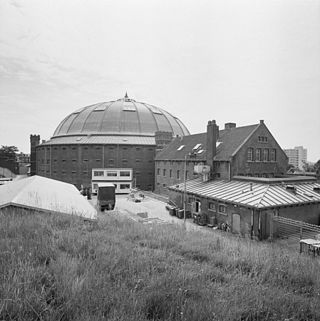
The Koepelgevangenis is a former prison in Arnhem, Netherlands. It is one of three Panopticon-style buildings situated in the country. Designed by Johan Metzelaar, the building was completed in 1886. A Rijksmonument, the prison closed in 2016. After the prison's closure, the building, along with the one at Haarlem, was used to house asylum seekers to the Netherlands.




















